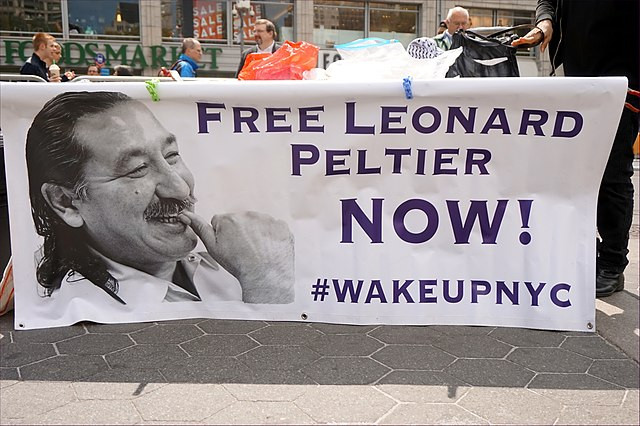Leonard Peltier, the 80-year-old Native American activist convicted in the 1975 killings of FBI agents, walked out of a Florida prison Tuesday after President Joe Biden commuted his life sentence to home confinement.
His release has already sparked controversy among law enforcement, including former FBI Director Christopher Wray and the FBI Agents Association, who oppose the move. Peltier, a member of the Turtle Mountain Band of Chippewa Indians in North Dakota, left the Coleman penitentiary in a sports utility vehicle without speaking to supporters gathered outside. He is headed back to his tribal homelands, where he will serve the remainder of his commuted sentence under house arrest.
In 1977, a jury found Peltier guilty of first-degree murder in connection with the shooting deaths of two FBI agents on the Pine Ridge Indian Reservation in South Dakota. For nearly 50 years, Peltier has maintained his innocence, insisting, "They may have imprisoned me but they never took my spirit!" in a statement released by the NDN Collective. Over the decades, he has become a symbol for many Native Americans who believe he was a political prisoner, unjustly targeted for his role in the American Indian Movement (AIM).
Supporters greeted Peltier's release with cheers and relief outside the prison, and he expressed optimism about returning to his community. In the words of his attorney, Jenipher Jones, "He is in good spirits. He has the soul of a warrior." Nick Tilsen, CEO of the Indigenous-led advocacy group NDN Collective, said in a statement that Peltier's release "is a symbol of our collective power and inherent freedom."
Calls for clemency had come from notable leaders including Pope Francis, the Dalai Lama, and the late Archbishop Desmond Tutu, as well as human rights organizations such as Amnesty International. "Leonard Peltier's release is the right thing to do given the serious and ongoing human rights concerns about the fairness of his trial, his nearly 50 years behind bars, his health and his age," said Paul O'Brien, executive director at Amnesty International USA. Peltier suffers from diabetes, hypertension, and complications from multiple bouts of COVID-19.
Others remain steadfastly critical of Biden's decision. Christopher Wray has previously referred to Peltier as "a remorseless killer," and Natalie Bara, president of The FBI Agents Association, condemned the commutation. "This last-second, disgraceful act by then-President Biden, which does not change Peltier's guilt but does release him from prison, is cowardly and lacks accountability," Bara said. Critics have pointed to Peltier's murder conviction and insist he has shown little remorse.
Peltier's legal team argued for decades that his trial was riddled with misconduct, including coerced testimony and withheld evidence. At trial, prosecutors claimed he shot the two agents at close range, while two other AIM members charged in connection with the incident were acquitted on self-defense grounds. According to supporters, Peltier's presence during the confrontation did not amount to conclusive evidence that he was responsible for the fatal shots.
Throughout his imprisonment, Peltier became a rallying point for Native American advocacy, representing deeper issues of historical injustice. "He represents every person who's been roughed up by a cop, profiled, had their children harassed at school," said Nick Estes, a professor of American Indian Studies at the University of Minnesota and a member of the Lower Brule Sioux Tribe. Many activists have highlighted Peltier's early experiences, including being taken from his family and placed in boarding schools as a child-an ordeal facing thousands of Indigenous children across the United States.
Despite recurring denials of parole, public pressure for executive clemency reached a peak in recent months. In his statement, Peltier declared, "I am finally going home. I look forward to seeing my friends, my family, and my community. It's a good day today." The NDN Collective has planned a celebration on Wednesday to welcome Peltier back to his homelands.
Administration officials confirmed that the commutation was part of a larger wave of clemency actions initiated by Biden at the end of his term, which included commutations and pardons for numerous federal inmates. Former Interior Secretary Deb Haaland, the first Native American to hold that position, applauded the decision. She and others have framed Peltier's release as a critical move toward recognizing Indigenous rights and rectifying past injustices.
Peltier's supporters now say that while he has been granted home confinement, his journey is far from finished. Ray St. Clair, who traveled from Minnesota to witness the moment, said, "We never thought he would get out. It shows you should never give up hope." As tribal members prepare a home for him in North Dakota, legal scholars and advocacy groups continue to debate the broader implications of his case and what it represents for Indigenous communities moving forward.






